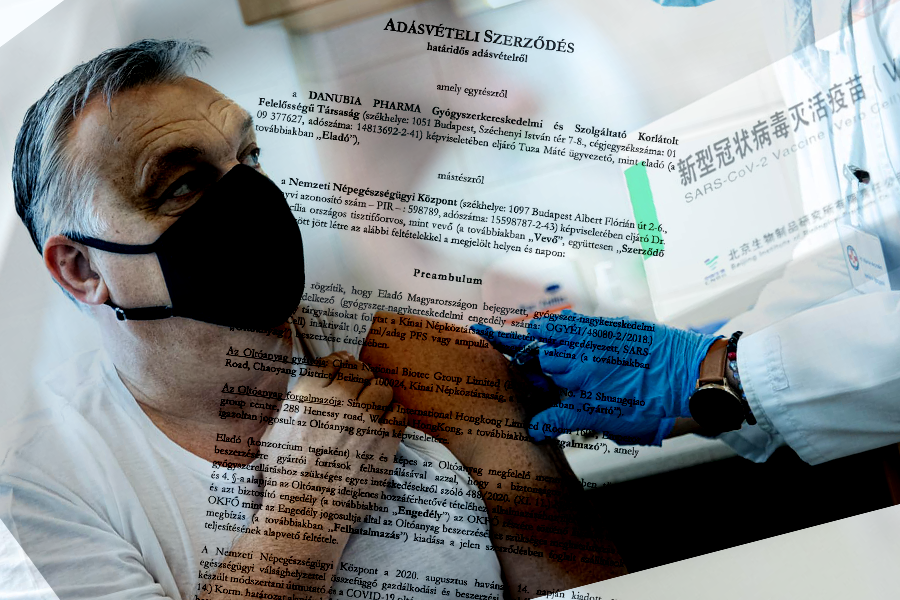Company with murky background is at the center of Hungary’s Chinese vaccine deal

- Hungary’s government decided to procure coronavirus vaccines from China through a middleman
- People behind this broker company importing the vaccines are unknown in the medicine retail industry
- One of them is a former certified ice hockey player and currently an employee of an energy drink company
- According to company records, this person acts on behalf of other shareholders, but it is unclear whom he represents
- A lawyer involved in the broker company’s administration links the vaccine procurement to the Hungarian goverment’s scandalous ventilator acquisitions in 2020
In the past week, many have been guessing who are benefiting from the huge €150m deal in which Hungary buys 5 million doses of Chinese-made coronavirus vaccines. It was on March 11 that Gergely Gulyás, Prime Minister Viktor Orbán’s chief of staff published the vaccine procurement contracts concluded by the Hungarian National Center for Public Health. It turned out that the Hungarian state did not contract Chinese vaccine distributor Sinopharm directly, but through a Hungarian company called Danubia Pharma Ltd.
Danubia Pharma is owned by a private limited company called Syntonite Med and thus profits made on vaccine imports go to Syntonite. Although Danubia Pharma is a pharmaceutical wholesale company that has been operating for more than ten years, Syntonite was only established last November, three days before its acquisition of Danubia Pharma. People behind the company have no known attachment to this industry or any other serious business.
Syntonite CEO Máté Tuza – who has also been CEO of Danubia Pharma since January – only had small consulting firms before. According to company registry, he owned three companies before, all making not more than a few million forints a year.
According to company records, there is another man currently involved in Syntonite, but he has even less entrepreneurial experience. His name is Csaba Gergely. Previously, he owned only one company. Café Edgar Ltd, founded in 2008, achieved no considerable financial success. A year after its formation, the Hungarian Tax Office already initiated an enforcement proceeding against it. Gergely left the company in 2010, and it eventually got liquidated in 2015.
Gergely had no other businesses until he became a founding shareholder of Syntonite last November, and, according to two of his acquaintances, he neither had previous ties to the pharmaceutical industry, nor to foreign trade. Gergely used to be a professional ice hockey player at teams like Ferencváros TC and UTE until his retirement in 2013. He never entirely gave up hockey as he is currently coaching for ’Zugló Piranhas’, an amateur Budapest hockey team.
At first, Gergely’s acquaintances would not believe when told by Direkt36 that he was involved in the €150m vaccine deal as founder of the company owning the importer. According to them, Gergely is currently employee of an energy drink company. One of them even wondered if “it’s not just a coincidental namesake confusion.”
But, according to personal data showed in company papers, it is certain that Gergely is involved in Syntonite. His exact role in the company, however, is not entirely clear. When the company was founded last November, Gergely acted as a founding shareholder owning 50 percent of the shares. In more recent company papers from February, however, he is referred to as a “shareholder trustee”, meaning he is not an actual shareholder but accredited to act on behalf of real shareholders.
Direkt36 called Csaba Gergely on Tuesday evening, but he refused to comment. “I can’t say anything about this,” he repeated multiple times before hanging up. Thus, he did not answer the question how he got into the vaccine business in the first place.
However, based on various company documents and previous press reports, it turns out that there is a connection. Through an acquaintance, Gergely is linked to a business circle that has already appeared around major government deals in connection with the handling of the coronavirus epidemic.
As Hungarian media outlet Valaszonline reported last September, an unusual deal was made on April 20, 2020, during the first wave of the epidemic. That day, the Hungarian Ministry of Foreign Affairs and Trade entered into a contract for the purchase of Chinese-made ventilators with a company called Fourcardinal Ltd. The very same day, a freshly founded company called SRF Silk Road Fund Holding Zrt. became partial owner of Fourcardinal.
One of SRF Silk Road Fund Holding Plc.’s founding shareholders was lawyer Zsolt Vámosi-Nagy. He was the same person paying the registration fee for Syntonite Plc. last November, as reported by Mfor. According to Direkt36’s research, Vámosi-Nagy is also an old acquaintance of Syntonite founder Csaba Gergely, the hockey coach. They are friends on Facebook, and can be seen together on old party photos from 2011. In addition, Vámosi-Nagy was also involved as a lawyer when registering Café Edgár, Gergely’s former company.
Direkt36 tried to contact Zsolt Vámosi-Nagy multiple times, but he did not answer neither our calls nor our email. We also sent an inquiry to the Prime Minister’s Office (which published the vaccine contract) and to the National Center for Public Health (representing the state in the transaction) but they have not responded.
The details of the Chinese vaccine purchase have been unknown initially. Although the contract was signed on 29 January, it was only published on the Facebook page of Minister Gergely Gulyás on 11 March after the government had rejected the public information requests of several media outlets.
Hungary will buy 5 million doses of Sinopharm vaccine from China by mid-June, and according to the contract, the price of vaccines is 30 euros (plus 5 percent VAT) per dose. Hungary will pay EUR 150 million in two installments (HUF 55 billion at the current exchange rate). The money will go to the pharmaceutical wholesale company Danubia Pharma, for which this is by far the largest business in its existence. Its sales revenue in 2019 was only HUF 362 million, a tiny fraction of what they will make with this deal.
This is not the first murky procurement in the government’s response to the coronavirus pandemic. Direkt36 has previously revealed irregularities surrounding government purchases of ventilators. For example, we showed that Hungary bought ventilators from China at an extremely high price last year: according to international trade data, the Hungarian government paid more than ten times the unit price per kilogram for the machines than what Italy paid and fifty times higher than what Germany paid.
The government boasted about ventilator purchases, yet Hungary made the worst deals across the EU
In connection with the mask purchases during the first wave of the pandemic, we showed that a senior official at one of the supplier companies was the father of a government consultant responsible for the purchase of masks.


